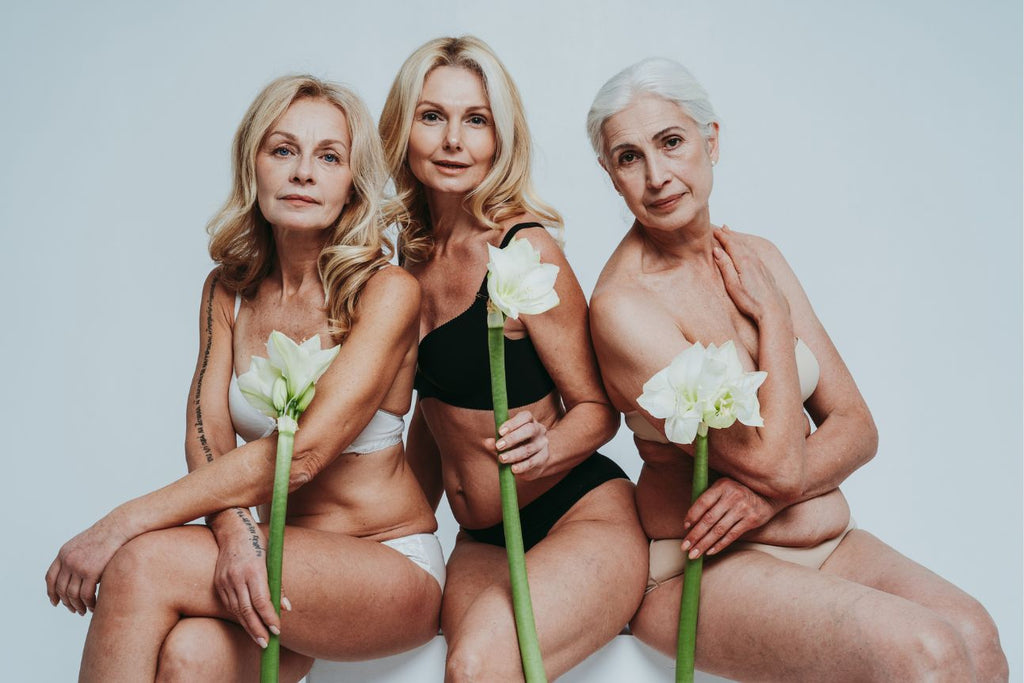Menopause: A Self-Love Journey

You are fabulous. Your body can do extraordinary things. We understand life is noisy and relentless, there is always a reason why you are last on the list. But come on, you deserve some love, nurturing, consideration and respect.
Whether you are entering a significant new chapter, uncertain if personal changes are noteworthy or perhaps you are deep into the journey already.
We see you.
Peri-menopause and beyond. It is one of the 3 most transformative hormonal evolutions alongside puberty and pregnancy.
As women, this era of our lives can feel lonely, we may feel unseen, forgotten and brushed aside. This extraordinary experience shakes us to our core, yet is hushed away - veiled in fear. To find a voice in the deafening silence around this topic has felt at times, overwhelming.
But things have started to change.
A new generation of stylish, savvy women in the public eye, our peers, the demographic of “Gen Xers”, have turned to social media to create a movement of empowerment, education and advocacy. By bringing the conversation to their public platforms, a more open dialogue has begun around how the change in our hormonal balance affects our mood, body image, skin, relationships etc.
Together, we represent one of the fastest growing demographics. It is believed that within 7 years (by 2030) the world population of menopausal and postmenopausal women is projected to increase to 1.2 billion (compared to 467 million in 1990), with 47 million new entrants each year.
But the menopause is not a fixed experience, it is a series of transitions and biological phases.
Premenopause – beginning usually sometime after 40. This is also called the climacteric phase, defining the stage when a woman begins to pass from reproductive to non-reproductive. This phase incorporates the peri-menopause.
Peri-menopause – the phase immediately before menopause itself and the year after menopause (last period).
Menopause – the natural menopause is defined as the permanent end of menstruation for 12 consecutive months, established in retrospect. (The World Health Organisation).
Postmenopause – dating from the last menstrual period.
Of course, there are occasions when menopause can be induced surgically or through medical treatment, which may mean things happen in a less linear way but the impact will undoubtedly have similarities.
What is clear to experts, support organisations and clinical researchers; is that there is a gap in our understanding of how best to support mental vulnerability during this time.
Research shows that during key hormonal shifts, there is a direct correlation with mental-health challenges and oestrogen level fluctuation. Sex hormones also affect brain function and the secretion of “feel-good” serotonin levels. The episodes of “brain fog”, low mood and depression can be associated with these structural hormonal shifts.
So no, you aren’t imagining it, you feel low for a reason. It’s science.
Because, while your mood is low, troublesome hormones are also affecting the texture, tone and resilience of skin, body shape, hair health etc. We deep dive into the effects of stress on our skin in our article that can be found here and provide some simple steps to help neutralise the effects of negative hormone release on your health and wellbeing.
Time to take care of ourselves.
If we understand more, we can shift personal patterns of behaviour to give ourselves a little self-love and improve our relationship with the changes. Getting to know our bodies can alleviate some of the negativity, stigma and misunderstanding.
Skin, Body & Mind:
As oestrogen levels drop, so too do key structural elements to skin, leaving it feeling a little more fragile and prone to the signs of time.
A huge part of our mind-set and positivity through this change, can come from our daily relationship with our reflection. Do you stand there analysing the changes in the mirror?
Time to be kinder to ourselves and cease the negative mental chatter.
Start with skin:
Does your body feels sluggish, patchy, perhaps itchy and unsettled? Quenching your skin with soothing ingredients and protecting the skin barrier from external aggressors will help recover resilience, while stimulating cell turnover through gentle exfoliation each week will help dissolve impurities, smooth skin texture and encourage a revitalised appearance to dull complexions.
Get moving:
Exercise is vital throughout life, but it is integral to exercise during the menopause. Strength training helps build and maintain muscle mass to protect bone density, support a healthy heart and keep hormonal weight shifts in check.
Temptations:
Alcohol and sweet treats may feel good when (peri-)menopausal mood is low; but ultimately, no good can come of indulging in the long-term. Ultimately, a naughty binge will bring our mood lower, elevate blood pressure, dehydrate skin, raise cortisol and decrease essential minerals that help preserve healthy sleep and mood. Not only that, but they contribute to fuelling those “power surges” of body-heat.
Of course, we know, not all things can be solved with a self-care ritual, some things require support from medical professionals. But, this is a time to show ourselves some love and put some care strategies in place to ensure we journey well through the transition.
Time to leave outdated mind-sets behind. Approach life with a sense of worth, gratitude, defined by routines of control, knowledge and positive action to help maintain resilience and perspective.
Resources:
Aging of the skin connective tissue: how to measure the biochemical and mechanical properties of aging dermis - https://pubmed.ncbi.nlm.nih.gov/8043384/
Sex hormones affect neurotransmitters and shape the adult female brain during hormonal transition periods - https://www.ncbi.nlm.nih.gov/pmc/articles/PMC4335177/
The demography of menopause - https://pubmed.ncbi.nlm.nih.gov/8735350/
Greater Monoamine Oxidase A Binding in Perimenopausal Age as Measured With Carbon 11–Labeled Harmine Positron Emission Tomography - https://jamanetwork.com/journals/jamapsychiatry/fullarticle/1878920?resultClick=3


